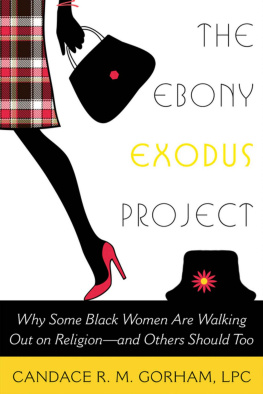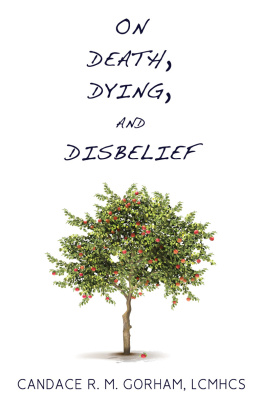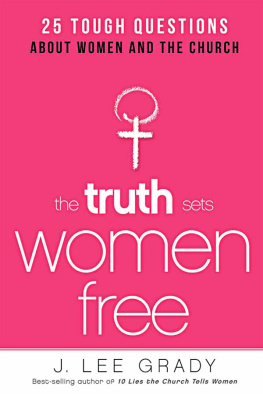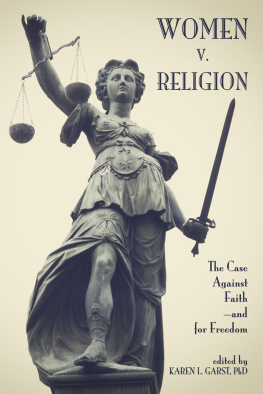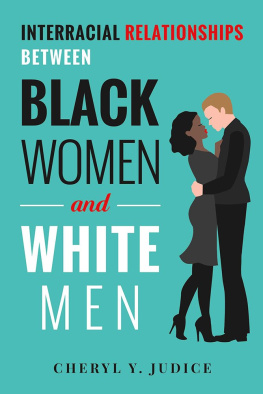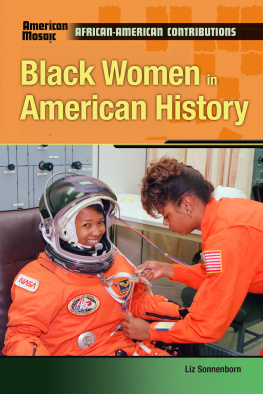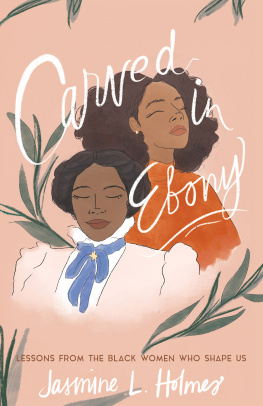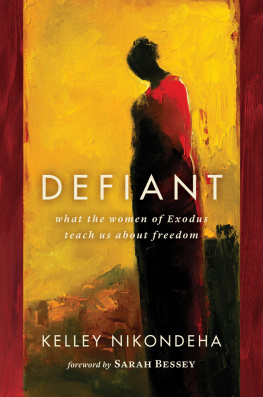
Pitchstone Publishing
Durham, NC 27705
www.pitchstonepublishing.com
Copyright 2013 by Candace R. M. Gorham, LPC
All rights reserved.
To contact the publisher, please e-mail
Printed in the United States of America
19 18 17 16 15 14 13 12345
Library of Congress Cataloging-in-Publication Data
Gorham, Candace R. M.
The ebony exodus project : why some Black women are walking out on religionand others should too / Candace R.M. Gorham, LPC.
pages cm
Includes bibliographical references and index.
ISBN 978-1-939578-02-0 (pbk. : alk. paper)
eISBN: 9781939578075
1. African American womenReligion. 2. African American churches. 3. African American womenSocial conditions. 4. African American womenEconomic conditions. 5. African American womenMental health. I. Title.
BR563.N4G675 2013
277.3'083082dc23
2013015333
CONTENTS
To Tamahl
for saying,
"Just start."
When people ask me about my reasons for starting the Ebony Exodus Project ( www.EbonyExodus.com )a forum for black women who are thinking about leaving organized religion or who have already left it behindmy response is always the same: black women are the single most religious demographic in the United States, yet they are at the bottom of the totem pole in practically every measure of quality of lifephysical health, financial health, mental health, and more.
If the Black Church wants to take credit for all of the good things that happen in the lives of black women, it must also take some of the blame for all of the bad things. You might get tired of hearing this refrain throughout this book, which is an extension of the broader Ebony Exodus Project, because I will repeat it. If readers walk away from this book with an increased awareness of one thing, my hope is that it will be the message contained in the italicized statement above.
I was one of those devout black women who really, really believed. From the age of five or six, I always believed. I was sure that god was going to bestow upon me all of the blessings the Bible speaks of precisely because I was a "true" believer who gave my all to god. So, I grew up to be an ordained ministerand a "statistic" regarding my physical health, my financial health, and, not least of which, my mental health.
As early as age eight or nine, I started displaying signs of mood disturbances, and by early adulthood, they were becoming debilitating. But everyoneall of my friends, family, pastors, and fellow church memberstold me that I absolutely was not depressed, that I wasn't "crazy," and that I shouldn't even "think like that" because I was such a strong woman.
I understand now that depression definitely runs in my family, but no one in my family saw depression for what it was, so all I could do was to try to bury my angst. And that's what I didfor years. My peers and elders at the church only amplified this pattern of denial. Indeed, regardless of whether a person is dealing with depression because of chronic environmental stressors or because of genetics, the church often does not acknowledge how serious a disease depression can be. By the time I had my daughter, the symptomsthe suicidality, the anger, the anxiety, the hopelessnesshad become too dangerous to ignore.
I took the frightening steps of seeking secular counseling and taking medication. In addition to the depression and anxiety that was ruining my life, I was morbidly obese. I prayed and tried to depend on god to help me lose weight. But the church to which I belonged did not do anything to help. There was little education on physical health in the church, and more problematically, my involvement with the church did not leave me time to take care of my physical self. I was busy nearly every day of the week attending services, delivering messages, conducting outreach, attending ministerial meetings, cleaning the building, and, oh yeah, attending more services.
At the age of twenty-one, I was ordained as an evangelist. Shortly thereafter I was ordained as an eldress and prophetess. With these positions, I was required to provide street ministry, preach messages, conduct home visits, and pray for church members. And I jumped in, full of gusto and zeal for the lord.
After a while, the belief that Jesus is all we need in the world began to lose its power of persuasion. The reason was simple: I educated myself. My story is not unique. As you will hear throughout this book, many ex-religious womenmyself includedbelieve that education is the most important step a woman can take to free herself from the bonds of religion. I'm not talking only about formal education, although that helps, too. For me, a combination of both formal and informal education put me on the path away from religious belief.
The journey began, ironically enough, when I decided to study my religion in depth precisely because I was having so many troubles in my lifeforeclosure, sickness, poverty. I truly believed that god had the answer for me, but that I must have been doing something wrong.
At the same time, I entered a graduate-level counseling program, which increased my sense of empathy, both toward myself and toward others whom I had always judged. In turn, I became more open to views I'd always found suspectincluding views that ran completely counter to what I myself had been actively preaching. Thus, as my studies progressed and I started to see, for example, that there were problems with the translation and interpretation of the Bible, my world was officially knocked off of its axis.
Through a long, slow, painful, and frightening process of over two years, I moved through stages of being an unaffiliated believer, to being a non-Christian theist, to being an agnostic, to finally being an atheist. Facebook and YouTube became my best friends as I interacted with other nonbelievers and watched religious debates. In addition to being exposed to the big names of the "new atheist" movement, I was also exposed to a whole new world of freethinkers, skeptics, and atheists. Of course, the most exciting find, for me, was groups of black nonbelievers and atheists. I had no idea that such a community existed.
Even today, I continue to struggle with talking to my old friends and family about my atheism. While many of the people close to me know that I disdain church and religion, I've never actually told any of them that I'm an "atheist," save two or three. To some, I've said, "I'm agnostic." To others, I've said, "I really don't care anymore."
I imagine that many of them have put two and two together simply by browsing my Facebook page, but I'm trying to start using the word "atheist" more. At the very moment that I am typing these words, I worry about how many of my relationships will be strained or end completely after this book is published.
Despite how heavy-laden the word "atheist" is, I feel so strongly about the topic and I care so much about the well-being of black women that I just had to follow my heart and write this book.
A Note about Labels and Self-identification
The following are important terms you will see in this book related to self-identity. It is important to recognize that, while these terms are not mutually exclusive, they do all have distinct meanings, and individuals have various reasons for accepting or rejecting certain terms in describing their identity and world view.
Atheistthe lack of a belief in a god. It's important to note that this does not mean that a person professes to know that there is not a god.
Agnosticliterally, without knowledge. Agnostics typically believe that we do not have enough knowledge to say whether there is or is not a god.
Next page
